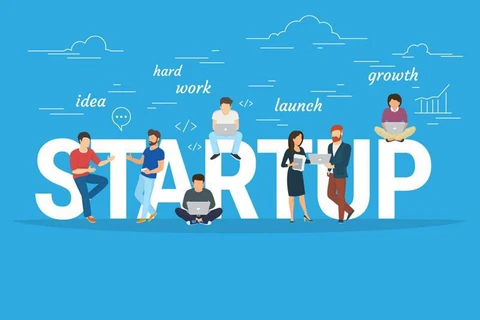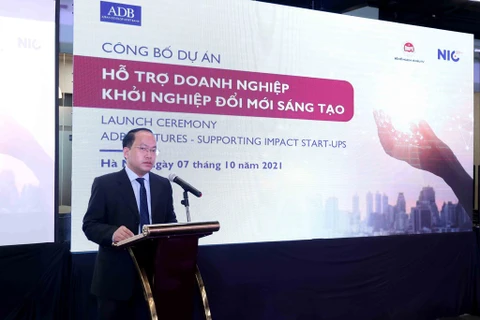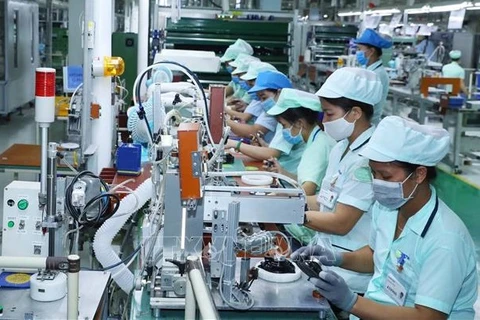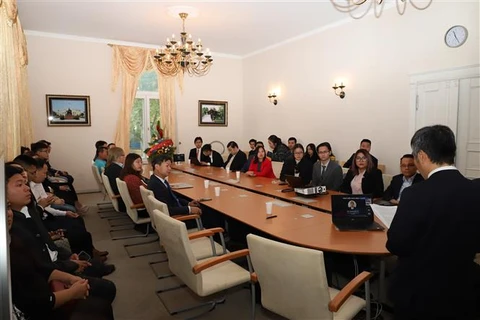Hanoi (VNA) - Reports on science, technology and innovation in Vietnam have shown that innovation will be a new impetus for Vietnam’s growth.
The Ministry of Science and Technology, in collaboration with the World Bank (WB) and the Australian Embassy, organized a workshop on November 3 to announce reports: “The Innovation Imperative for Developing East Asia,” “The Vietnam Science, Technology and Innovation (STI),” and “The Technological Innovation in Vietnam - Assessing the Impact of Technology on Economic Growth.”
New motivations for economic growth
“The Vietnam Science, Technology and Innovation” report is the product of the World Bank's programme on analytical support and consultation for improving Vietnam's innovation capacity.
The report is implemented under the WB's Vietnam Enhancing Innovation Analytical and Advisory Services (ASA) programme, which is sponsored by the Australia - World Bank Group Strategic Partnership in Vietnam - Phase 2 (ABP2).
Carolyn Turk, WB Country Director in Vietnam, said that Vietnam will need new motivations for its economic growth to become a high income economy by 2045. Innovation will help build a fundamental foundation for the country to increase income and improve the growth quality.
However, there are different approaches for fostering innovation, and this report offers ideas that may be relevant for Vietnam, she said.
The report recommends that Vietnam should re-balance its science and technology and innovation development policies. It should switch its resource focus from the creation of advanced technologies to the adoption and diffusion of existing technologies among groups of businesses.
Technological spillovers – not just research and development – can lead to significant productivity and economic transformation. This is the crux of policy interventions, and government support can be most beneficial.
Experts said that attention to capacity building in order to take full advantage of the most up-to-date technologies should be a top priority. Narrowing the workforce skills gap will also be critical to harnessing the full power of innovation.
The report also pointed out that the STI policies have yet to match the capacity and demand of businesses and organisations.
This is also a common problem among countries in the region, one reason for technological lagging behind advanced economies.
The report said that deeper application of innovation can help countries overcome new challenges to continue to thrive. It included factors of global geopolitical conflict, the COVID-19 pandemic, climate change, and dramatic decline in productivity growth.
A comprehensive reform scheme is necessary to spur innovation, the report stressed.
Apart from re-orienting science, technology and innovation policies to better suit the capability and need of businesses, countries need to strengthen important complementary factors for innovation such as labourers’ skills and access to finance for innovative projects.
Impacts of technology on economic growth
The impact of technology absorption is also considered in “The Technological Innovation in Vietnam - Assessing the Impact of Technology on Economic Growth” report. It was jointly implemented by the Commonwealth Scientific and Industrial Research Organisation (CSIRO) – the Australian Government statutory authority, and units of the Vietnamese Ministry of Science and Technology.
Sponsored by the Aus4Innovation Programme, the report provides tools to assess the status quo and impact of technological progress and innovation on Vietnam's economic growth.
By applying economic models to a large database of enterprises’ technology absorption in Vietnam, the report’s findings show that technology contributed greatly to the economic growth of Vietnam in the 2016-2019 period.
According to Australian Ambassador to Vietnam Robyn Mudie, a team of Australian and Vietnamese researchers conducted this report for a year and a half. They collected and analyzed data over a period of nearly 20 years to develop two modern economic models to quantify the contribution of technological progress to economic growth.
She said Australia has been assisting Vietnam in making decisions on evidence-based policies in the area of science, technology and innovation (STI). Australia hopes that the MOST can adopt this model in building long-term policies for STI development, she added.
The report is an important policy reference in Vietnam's economic transition to 2030, with a vision to 2045. It shows that effectiveness and innovation factor play an increasingly important role in economic growth compared to capital and cheap labour.
Speaking at the ceremony, Minister of Science and Technology Huynh Thanh Dat emphasized that the reports clearly show the important role of STI in socio-economic growth in Vietnam. The path for Vietnam moving forward is constantly improving and enhancing the innovation ecosystem’s capacity./.

























